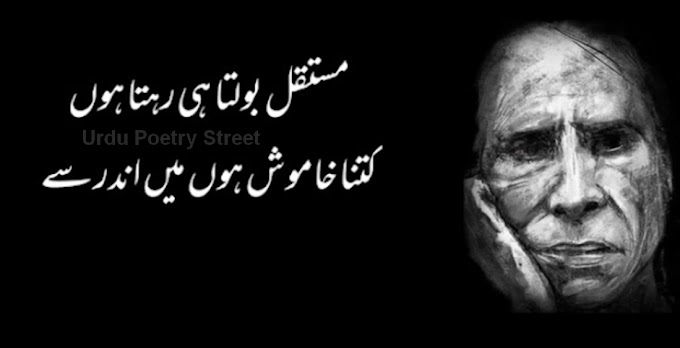Waqt e Rukhsat Aa Gea
Waqt e Rukhsat Aa Gea Dil Phir Bhi Ghabraya Nei
Us Ko Hum Kia Khoein Gy Jis Ko Khabi Paya Nei
Zindgi Jitni Bhi Hai Ab Mustaqil Sehra Mein Hai
Aor Us Sehra Mein Tera Door Tak Saya Nei
Meri Qismat Mein Faqat Dard e Teh Saghir He Hai
Awal Shabb Jaam Meri Simt Woh Laya Nei
Teri Aankhon Ka Bhi Kuchh Halqa Gulabi Rang Tha
Zehen Ne Mere Bhi Ab Ky Dil Ko Samjhaya Nei
Kaan Bhi Khani Hein Mere Aor Dono Hath Bhi
Ab Ky Fasl e Gul Ne Mujh Ko Phool Pehnaya Nei
وقت ِرخصت آگیا ، دل پھر بھی گھبرایا نہیں
اس کو ہم کیا کھوئیں گے جس کو کبھی پایا نہیں
زندگی جتنی بھی ہے اب مستقل صحرا میں ہے
اور اس صحرا میں تیرا دور تک سایہ نہیں
میری قسمت میں فقط درد تہہ ساغر ہی ہے
اول شب جام میری سمت وہ لایا نہیں
تیری آنکھوں کا بھی کچھ ہلکا گلابی رنگ تھا
ذہن نے میرے بھی اب کے دل کو سمجھایا نہیں
کان بھی خالی ہیں میرے اور دونوں ہاتھ بھی
اب کے فصل گل نے مجھ کو پھول پہنایا نہیں
Interpretation
1. "Waqt e Rukhsat Aa Gea Dil Phir Bhi Ghabraya Nei" - "The time of departure has come, yet the heart remains unfiltered."
Here, the speaker acknowledges the inevitability of parting or separation ("Waqt e Rukhsat"), yet they express a surprising calmness or lack of agitation in their heart ("Dil Phir Bhi Ghabraya Nei"). This juxtaposition suggests a sense of acceptance or resignation to the situation, despite the emotional weight of the moment.
2. "Us Ko Hum Kia Khoein Gy Jis Ko Khabi Paya Nei" - "What will I lose that I haven't found?"
In this line, the speaker questions what they will truly lose by parting with something or someone they haven't truly possessed or experienced ("Jis Ko Khabi Paya Nei"). It conveys a sense of detachment or scepticism towards the significance of the separation, implying that there may not be much to lose if the connection was never deeply established.
3. "Zindgi Jitni Bhi Hai Ab Mustaqil Sehra Mein Hai" - "Life, however long, is now a journey in the vast desert."
This line metaphorically describes life as a journey through an expansive desert ("Sehra"), emphasising the vastness and uncertainty of the path ahead. It suggests a feeling of isolation or desolation, as the speaker navigates the challenges and uncertainties of existence.
4. "Aor Us Sehra Mein Tera Door Tak Saya Nei" - "And in that desert, there is no shade till your door."
Continuing the desert metaphor, this line highlights the absence of shelter or refuge ("Saya") in the vast expanse of life until the presence of the beloved is reached. It underscores the longing for the comforting presence of the beloved amidst the challenges and trials of life.
5. "Meri Qismat Mein Faqat Dard e Teh Saghir He Hai" - "In my fate, there is only a minor pain."
Here, the speaker reflects on the limited extent of suffering or pain ("Dard e Teh Saghir") that destiny has assigned to them. It suggests a sense of resignation or acceptance towards their lot in life, acknowledging that their hardships may pale in comparison to others.
6. "Awal Shabb Jaam Meri Simt Woh Laya Nei" - "At the beginning of the night, that person did not come towards me."
This line evokes a sense of disappointment or longing as the speaker recounts the absence of the beloved ("Woh") at the beginning of the night. It underscores the yearning for the presence or companionship of the beloved, particularly during moments of solitude or darkness.
7. "Teri Aankhon Ka Bhi Kuchh Halqa Gulabi Rang Tha" - "Even your eyes had a tinge of rosy colour."
Here, the speaker recalls the beauty or allure of the beloved's eyes ("Teri Aankhon Ka Bhi"), likening them to the delicate hue of roses ("Halqa Gulabi Rang"). It conveys a sense of admiration or fondness for the beloved's physical features, highlighting their captivating presence.
8. "Zehen Ne Mere Bhi Ab Ky Dil Ko Samjhaya Nei" - "Yet my mind has not been able to explain it to my heart."
In this line, the speaker reflects on the inability of their rational mind ("Zehen") to reconcile or convey their emotions to their heart ("Dil"). It suggests a disconnect or struggle between intellect and emotion, emphasising the complexity of the speaker's inner turmoil or longing.
9. "Kaan Bhi Khani Hein Mere Aor Dono Hath Bhi" - "My ears are eager and so are my hands."
Here, the speaker expresses a sense of anticipation or readiness ("Kaan Bhi Khani Hein," "Dono Hath Bhi") for an awaited or desired experience. It conveys a sense of eagerness or longing for engagement or connection, highlighting the speaker's desire for closeness or interaction.
10. "Ab Ky Fasl e Gul Ne Mujh Ko Phool Pehnaya Nei" - "But the season of flowers has not bestowed me with a bloom."
This line metaphorically describes the disappointment or unfulfilled expectations ("Phool Pehnaya Nei") of the speaker as they await the arrival of a desired experience or outcome amidst the changing seasons ("Fasl e Gul"). It conveys a sense of longing or yearning for the fulfilment of desires or aspirations, juxtaposed against the barrenness or lack of fruition in their current circumstances.
Overall, this verse captures a spectrum of emotions including resignation, longing, disappointment, and anticipation as the speaker navigates the complexities of life, love, and longing. Through rich metaphorical imagery and introspective reflection, the verse offers profound insights into the human experience and the intricacies of emotional longing and fulfilment.










